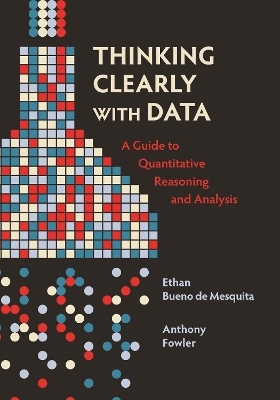
Thinking Clearly with Data
A Guide to Quantitative Reasoning and Analysis
Seiten
2021
Princeton University Press (Verlag)
978-0-691-21435-1 (ISBN)
Princeton University Press (Verlag)
978-0-691-21435-1 (ISBN)
An engaging introduction to data science that emphasizes critical thinking over statistical techniques
An introduction to data science or statistics shouldn’t involve proving complex theorems or memorizing obscure terms and formulas, but that is exactly what most introductory quantitative textbooks emphasize. In contrast, Thinking Clearly with Data focuses, first and foremost, on critical thinking and conceptual understanding in order to teach students how to be better consumers and analysts of the kinds of quantitative information and arguments that they will encounter throughout their lives.
Among much else, the book teaches how to assess whether an observed relationship in data reflects a genuine relationship in the world and, if so, whether it is causal; how to make the most informative comparisons for answering questions; what questions to ask others who are making arguments using quantitative evidence; which statistics are particularly informative or misleading; how quantitative evidence should and shouldn’t influence decision-making; and how to make better decisions by using moral values as well as data. Filled with real-world examples, the book shows how its thinking tools apply to problems in a wide variety of subjects, including elections, civil conflict, crime, terrorism, financial crises, health care, sports, music, and space travel.
Above all else, Thinking Clearly with Data demonstrates why, despite the many benefits of our data-driven age, data can never be a substitute for thinking.
An ideal textbook for introductory quantitative methods courses in data science, statistics, political science, economics, psychology, sociology, public policy, and other fields
Introduces the basic toolkit of data analysis—including sampling, hypothesis testing, Bayesian inference, regression, experiments, instrumental variables, differences in differences, and regression discontinuity
Uses real-world examples and data from a wide variety of subjects
Includes practice questions and data exercises
An introduction to data science or statistics shouldn’t involve proving complex theorems or memorizing obscure terms and formulas, but that is exactly what most introductory quantitative textbooks emphasize. In contrast, Thinking Clearly with Data focuses, first and foremost, on critical thinking and conceptual understanding in order to teach students how to be better consumers and analysts of the kinds of quantitative information and arguments that they will encounter throughout their lives.
Among much else, the book teaches how to assess whether an observed relationship in data reflects a genuine relationship in the world and, if so, whether it is causal; how to make the most informative comparisons for answering questions; what questions to ask others who are making arguments using quantitative evidence; which statistics are particularly informative or misleading; how quantitative evidence should and shouldn’t influence decision-making; and how to make better decisions by using moral values as well as data. Filled with real-world examples, the book shows how its thinking tools apply to problems in a wide variety of subjects, including elections, civil conflict, crime, terrorism, financial crises, health care, sports, music, and space travel.
Above all else, Thinking Clearly with Data demonstrates why, despite the many benefits of our data-driven age, data can never be a substitute for thinking.
An ideal textbook for introductory quantitative methods courses in data science, statistics, political science, economics, psychology, sociology, public policy, and other fields
Introduces the basic toolkit of data analysis—including sampling, hypothesis testing, Bayesian inference, regression, experiments, instrumental variables, differences in differences, and regression discontinuity
Uses real-world examples and data from a wide variety of subjects
Includes practice questions and data exercises
Ethan Bueno de Mesquita is the Sydney Stein Professor and deputy dean at the Harris School of Public Policy at the University of Chicago. He is the author of Political Economy for Public Policy and the coauthor of Theory and Credibility: Integrating Theoretical and Empirical Social Science (both Princeton). Twitter @ethanbdm Anthony Fowler is a professor at the Harris School of Public Policy at the University of Chicago.
| Erscheinungsdatum | 13.01.2022 |
|---|---|
| Zusatzinfo | 32 b/w illus. 81 tables. |
| Verlagsort | New Jersey |
| Sprache | englisch |
| Maße | 178 x 254 mm |
| Themenwelt | Informatik ► Datenbanken ► Data Warehouse / Data Mining |
| Sozialwissenschaften ► Politik / Verwaltung ► Politische Theorie | |
| Sozialwissenschaften ► Soziologie ► Empirische Sozialforschung | |
| ISBN-10 | 0-691-21435-2 / 0691214352 |
| ISBN-13 | 978-0-691-21435-1 / 9780691214351 |
| Zustand | Neuware |
| Haben Sie eine Frage zum Produkt? |
Mehr entdecken
aus dem Bereich
aus dem Bereich
Datenanalyse für Künstliche Intelligenz
Buch | Softcover (2024)
De Gruyter Oldenbourg (Verlag)
CHF 104,90
Auswertung von Daten mit pandas, NumPy und IPython
Buch | Softcover (2023)
O'Reilly (Verlag)
CHF 62,85


